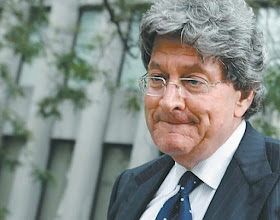Corporate fraud's red flag: arrogance
Drabinsky's downfall began when he gave in to hubris
Brett Gundlock, National Post Files Was Garth Drabinsky, the former CEO and controlling shareholder of Livent, a victim of his own hubris?
(...)
In our analysis of Canadian fraud cases between 1995 and 2005 (including Livent, Hollinger, Bre-X, Cinar, etc.), we argue that hubris -- exaggerated pride or self-confidence --constitutes a key reason why some successful executives or entrepreneurs engage in fraudulent activities. Hubris also explains why they are able to initially manoeuvre around governance, auditing or regulatory monitors. The tipping point is typically reached when media and investment community coverage of the executive becomes too fawning. Hence, managerial fraud goes beyond reflecting the rational pursuit of self-interest, a position that is put forward by most auditors or regulators.
In our analysis of Canadian fraud cases between 1995 and 2005 (including Livent, Hollinger, Bre-X, Cinar, etc.), we argue that hubris -- exaggerated pride or self-confidence --constitutes a key reason why some successful executives or entrepreneurs engage in fraudulent activities. Hubris also explains why they are able to initially manoeuvre around governance, auditing or regulatory monitors. The tipping point is typically reached when media and investment community coverage of the executive becomes too fawning. Hence, managerial fraud goes beyond reflecting the rational pursuit of self-interest, a position that is put forward by most auditors or regulators.
(...)
Garth Drabinsky and Livent illustrate our findings. In 1994-1995, Livent's production of "Show Boat" was one of the highest grossing shows on Broadway and received five Tony Awards. By the end of 1996, Mr. Drabinsky stake in Livent was worth more than $30-million, with his 1996 compensation package reaching more than $3-million (including stock options). He was also a fixture of the celebrity pages. At the same time, he was deepening his involvement in a series of fraudulent financial reporting, expensing and disclosure activities. Yet, Livent's board comprised some of Canada's most astute and well-known private investors, with its financial statements being audited by one of Canada's largest accounting firms while it completed a successful equity issue in 1996 through two reputable investment banks.
Mr. Drabinsky certainly had the opportunity and financial incentives to engage in fraud: He was the founder, chair and CEO. In addition, Livent's stock market capitalization was most likely inflated and needed to be maintained by growing earnings while his jet set lifestyle required recurring income from bonuses and stock options. However, in our view, his downfall began when he succumbed to hubris and allowed himself to be governed by an exaggerated sense of self-confidence.
Garth Drabinsky and Livent illustrate our findings. In 1994-1995, Livent's production of "Show Boat" was one of the highest grossing shows on Broadway and received five Tony Awards. By the end of 1996, Mr. Drabinsky stake in Livent was worth more than $30-million, with his 1996 compensation package reaching more than $3-million (including stock options). He was also a fixture of the celebrity pages. At the same time, he was deepening his involvement in a series of fraudulent financial reporting, expensing and disclosure activities. Yet, Livent's board comprised some of Canada's most astute and well-known private investors, with its financial statements being audited by one of Canada's largest accounting firms while it completed a successful equity issue in 1996 through two reputable investment banks.
Mr. Drabinsky certainly had the opportunity and financial incentives to engage in fraud: He was the founder, chair and CEO. In addition, Livent's stock market capitalization was most likely inflated and needed to be maintained by growing earnings while his jet set lifestyle required recurring income from bonuses and stock options. However, in our view, his downfall began when he succumbed to hubris and allowed himself to be governed by an exaggerated sense of self-confidence.

